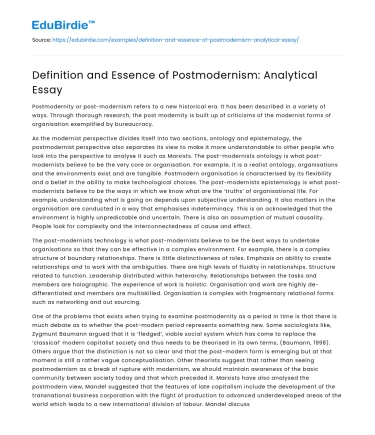Introduction
Postmodernism, a multifaceted movement that emerged in the mid-20th century, challenges conventional notions of art, literature, and philosophy. Characterized by a skepticism towards grand narratives and ideologies, it emphasizes the role of language, power dynamics, and societal constructs in shaping human experience. As a reaction against the perceived certainty and objectivity of modernism, postmodernism embraces ambiguity, contradiction, and pluralism. This essay seeks to explore the essence of postmodernism by examining its defining features, cultural implications, and the criticisms it has faced. Through an analytical lens, we will delve into how postmodernism has reshaped our understanding of reality and knowledge, and its impact on contemporary thought. Furthermore, this discussion will address counter-arguments to highlight the complexities and controversies that surround this influential movement.
Key Characteristics and Philosophical Underpinnings
Postmodernism is distinguished by its rejection of universal truths and its embrace of relativism. This philosophical stance is rooted in the ideas of prominent thinkers such as Jean-François Lyotard, who famously declared the "end of grand narratives" (Lyotard, 1979). According to Lyotard, metanarratives, or overarching stories that claim to explain and legitimize knowledge, are inherently oppressive. Instead, postmodernism advocates for a multiplicity of perspectives, acknowledging the fragmented and subjective nature of reality. This philosophical shift is evident in various disciplines, from architecture, where deconstructivism challenges traditional forms, to literature, where metafiction blurs the lines between reality and fiction.
Save your time!
We can take care of your essay
- Proper editing and formatting
- Free revision, title page, and bibliography
- Flexible prices and money-back guarantee
Moreover, postmodernism interrogates the role of language and symbols in constructing meaning. Influenced by Jacques Derrida's concept of "deconstruction," postmodernists argue that language is inherently unstable and open to multiple interpretations. This idea undermines the modernist pursuit of objective truth, suggesting that meaning is always contingent upon context and perspective. In art, this is reflected in the works of artists like Andy Warhol, whose use of mass-produced imagery questions the authenticity and originality of artistic expression.
Transitioning from the abstract to the tangible, postmodernism also manifests in societal and cultural realms. It critiques established power structures and hierarchies, advocating for marginalized voices and alternative narratives. This democratization of discourse is evident in the rise of subcultures and the blending of high and low art forms. As such, postmodernism not only reshapes intellectual paradigms but also influences everyday cultural practices.
Cultural Implications and Real-World Applications
The impact of postmodernism extends beyond theoretical discourse, permeating various aspects of culture and society. In media and communication, for instance, postmodernism is reflected in the proliferation of hyperreality—a concept popularized by Jean Baudrillard. Hyperreality blurs the distinction between reality and simulation, as seen in phenomena like reality television and digital media, where the lines between fact and fiction are increasingly ambiguous. This has profound implications for how individuals perceive and interact with the world, raising questions about authenticity and representation.
In the realm of politics, postmodernism's critique of grand narratives has led to a skepticism of ideological commitments and traditional power structures. This has given rise to what some describe as "post-truth" politics, where emotional appeal and subjective beliefs often overshadow factual evidence. While this democratization of information can empower diverse voices, it also poses risks to informed public discourse and democratic processes. As critics argue, the relativism inherent in postmodern thought can lead to cynicism and an erosion of shared values, complicating efforts to address global challenges effectively.
Despite these challenges, postmodernism has also fostered a more inclusive and pluralistic society. By questioning dominant narratives, it has paved the way for the recognition and celebration of diverse identities and experiences. This is particularly evident in movements advocating for gender and racial equality, where postmodernism's emphasis on difference and hybridity has facilitated a more nuanced understanding of identity politics. As such, while postmodernism may complicate notions of truth and authority, it also enriches our cultural landscape by embracing diversity and complexity.
Criticisms and Counter-Arguments
While postmodernism has revolutionized various fields, it has not been without its critics. Detractors argue that its rejection of objective truth and emphasis on relativism can lead to nihilism and a lack of moral direction. Philosopher Jürgen Habermas, for instance, contends that postmodernism undermines the Enlightenment ideals of reason and progress, potentially jeopardizing efforts to achieve social justice and equality (Habermas, 1981). Critics further assert that by deconstructing established norms and values, postmodernism risks promoting a sense of disorientation and instability in society.
However, proponents of postmodernism counter these claims by emphasizing its potential for liberation and empowerment. By challenging oppressive structures and embracing multiplicity, postmodernism encourages critical thinking and fosters creativity. It invites individuals to question assumptions and engage with diverse perspectives, leading to a more inclusive and dynamic cultural discourse. Moreover, postmodernism's critique of power dynamics highlights the need for vigilance and accountability in an increasingly complex world.
The tension between these perspectives underscores the complexity of postmodernism as both a theoretical framework and a cultural phenomenon. While it poses certain challenges, its contributions to intellectual and cultural life cannot be overlooked. By acknowledging its limitations and potential pitfalls, we can better appreciate the ways in which postmodernism continues to shape contemporary thought and practice.
Conclusion
In conclusion, postmodernism represents a paradigm shift in how we understand and engage with the world. By questioning grand narratives and embracing relativism, it challenges us to reconsider the nature of truth, reality, and knowledge. Through its influence on art, culture, and politics, postmodernism has reshaped our intellectual landscape, fostering a more inclusive and pluralistic society. While it faces criticism for its perceived relativism and potential for nihilism, its emphasis on diversity and critical inquiry offers valuable insights into the complexities of the modern world. As we navigate the uncertainties of the 21st century, the essence of postmodernism serves as both a challenge and an opportunity, inviting us to embrace ambiguity and engage with diverse perspectives in our pursuit of understanding and progress.






 Stuck on your essay?
Stuck on your essay?

